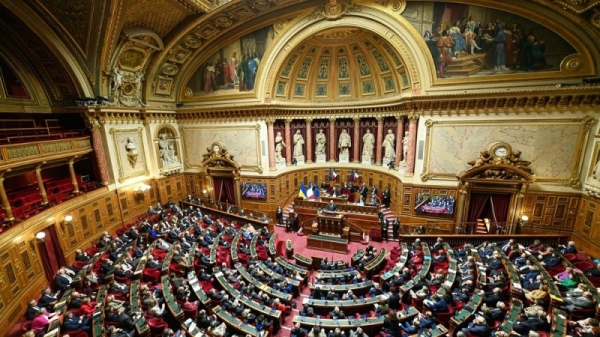French Senate urges EU to trace deported Ukrainian children, sanction those involved

French Senate has urged EU institutions and countries to gather evidence of the forcible transfer of Ukrainian children to Russia and sanction Russian officials involved in these crimes, Senator André Gattolin told EURACTIV France on Wednesday (19 April).
Gattolin spoke to EURACTIV after the Senate’s Foreign Affairs, Defence, and Armed Forces Committee adopted the resolution on Ukrainian children – the first of its kind in Europe – on Monday.
The resolution condemns “the deportation of Ukrainian children by the Russian Federation” and the attitude of the Moscow regime, which “proceeds in an administrative and massive manner to the naturalisation, change of name and filiation of children transferred to its territory”. It was unanimously supported.
For comparison, during a previous vote in the National Assembly on a resolution qualifying the 1932-1933 famine in Ukraine, known as the Holodomor, as genocide, the radical left (La France Insoumise) boycotted the vote and while Communist Party voted against.
Speaking to EURACTIV, Senator Gattolin, who initiated the Senate’s resolution, explained that he had undertaken this initiative in the summer of 2022 to shed light on Moscow’s crimes, which were way below the radar at that time.
Since then, the International Criminal Court (ICC) issued an arrest warrant on 17 March against Russian President Vladimir Putin and Maria Lvova-Belova, his “presidential commissioner for children’s rights”, who organises these massive transfers of Ukrainian children to Russia.
Gattolin said he hoped the Senate’s position would enhance a joint initiative announced by the European Commission and Poland in February, whose focus is to collect evidence, find the children and bring to justice those responsible for these crimes”.
But Gattolin also hopes that the sanctions against those responsible for child kidnappings will be broadened. A first wave of sanctions concerning this specific issue was already contained in the 10th EU sanctions package adopted in late February.
In general, Gattolin said, the Senate’s resolution, which has no legal bearing, should help increase pressure on the Russian regime, particularly as “everything is being done to hide these children”.
He also highlighted the difficulty in collecting evidence and tracing the abducted children.
“The aim of the resolution is also to ask the European Union and the member states to contribute as much as possible to the collection of information and intelligence.”
“We can identify population flows to Russia by satellite images, check internet or telephone connections”, he explained, adding it was also necessary to proceed to the precise identification of each child likely to have been forcibly transferred to Russia.
These two elements, necessary for a proper investigation and judicial follow-up, are complicated by the difficult access to areas beyond the front line and the difficulty of communicating with the people.
Gattolin said humanitarian organisations such as the Red Cross and UNICEF are the only ones currently able to go to these places to collect evidence and testimonies.
The resolution urges the French government to “increase the volume of human, material and financial means and resources” granted to Eurojust, the EU Agency for Criminal Justice Cooperation.
It also calls for “an international diplomatic initiative” to allow “international humanitarian organisations […] to have access to these children on Russian territory and in areas controlled by Russia in order to open channels of communication and to rapidly initiate the process of return of Ukrainian children to Ukraine”.
The importance of such investigations and research, Gattolin said, is also to establish whether there have been even more serious crimes: The figure put forward by Russia – more than 700,000 displaced children – could also be used to hide some of the murders of children, according to Gattolin.
The lower house of the French parliament, the National Assembly, is expected to follow the Senate’s lead in the coming weeks or months.
Gattolin said he had sent the text of his resolution in English and French to colleagues in other parliamentary assemblies across the continent, hoping to see the initiative multiplied.
Finally, Gattolin said, this type of resolution is a way of reminding Western public opinion of how essential it is to continue supporting the Ukrainian authorities and refuse to be accomplices to the crimes of the Russian regime.

Several thousand Ukrainian children ‘forcibly relocated to Russia’, HRW says
Since Russia’s invasion of Ukraine last February, thousands of Ukrainian children in foster care have been forcibly transferred to occupied territories or to Russia itself, according to Human Rights Watch (HRW).



